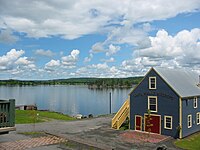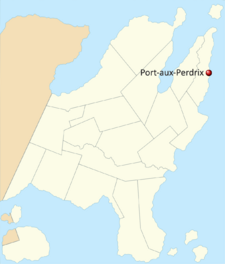Port-aux-Perdrix
Port-aux-Perdrix (/ˌpɔɹt oʊ ˈpɛəɹdɹiː/, French: /ˌpɔʁ o pɛʁˈdʁi/) is a unincorporated community located in Hauteterre county, Iylan Province, Rhodevus.
Port-aux-Perdrix
Port Partridge | |
|---|---|
Village | |
 Port-aux-Perdrix Harbour | |
 Port-aux-Perdrix's location in Iylan Province. | |
| Country | Rhodevus |
| Province | Iylan Province |
| County | Hauteterre |
| Founded | 1873 |
| Government | |
| • Type | County Council |
| • Body | Conseil du comté Hauteterre |
| • Warden | Rhéal Caron |
| Area | |
| • Total | 8.2 km2 (3.2 sq mi) |
| Elevation | 3 m (10 ft) |
| Population (2015) | |
| • Total | 639 |
| • Density | 78/km2 (200/sq mi) |
It is situated on the southern shore of Partridge Bay (Baie du Perdrix), an inlet of the Lutetian Ocean on the eastern coast of the Saint-Jean peninsula. Port-aux-Perdrix was founded in 1873 by French-speaking settlers, who named it after the numerous partridges living in the forests around the bay. After reaching a peak population of 2,076 in 1925, Port-aux-Perdrix's population has gradually fallen, counting 639 residents in 2015. The village lies in the Francophone areas of Rhodevus, and a large majority of its inhabitants count French as their mother tongue. Port-aux-Perdrix relies heavily on fishing as a source of income and is the main employer in the community, though it is feared that the village's population will continue to decrease along with economic output, accelerated by the opening of a cannery in a nearby town (WHERE?), pulling more jobs away from the community. The mayor and residents have pleaded government officials for funding and resources to keep their childhood home alive.
History
The area Port-aux-Perdrix occupies today has been inhabited for thousands of years by indigenous peoples, who called it NAME. The first explorers are believed to have come in the early 16th century, with the first definitive account of the area recorded in 1568 by Georges Éupéry de Montblanc.
We rounded today a point, I presume to be the Cap Sainte-Marie, across which lay a bay of water in a forested land. Upon entering the calm waters, many gamebirds were seen. We make our camp here tonight; there is surely plentiful food to be found in the waters and in the land. (trad. from French)
— Un racont des voyages au Nord et la vie de Georges Éupéry de Montblanc, 1523-1571